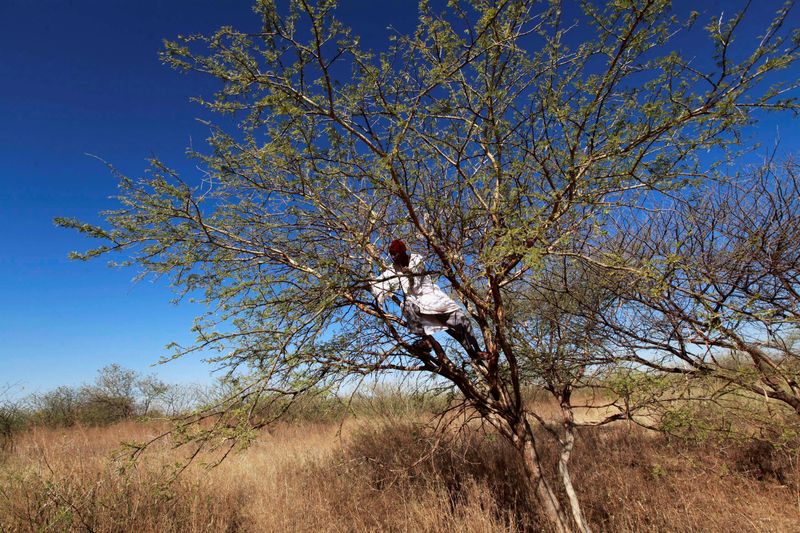By Richa Naidu and Jessica DiNapoli
LONDON/NEW YORK (Reuters) - Sudan's eruption into conflict has left international consumer goods makers racing to shore up supplies of gum arabic, one of the country's most sought-after products and a key ingredient in everything from fizzy drinks to candy and cosmetics.
About 70% of the world's supply of gum arabic, for which there are few substitutes, comes from the acacia trees in the Sahel region that runs through Africa's third-largest country, which is being torn apart by fighting between the army and a paramilitary force.
Wary of Sudan's persistent insecurity, companies dependent on the product, such as Coca Cola and Pepsico (NASDAQ:PEP), have long stockpiled supplies, some keeping between three-to-six-months worth to avoid being caught short, exporters and industry sources told Reuters.
However, prior conflicts have tended to be focused in far-flung regions such as Darfur. This time, the capital Khartoum has been brought to a standstill in the fighting that broke out on April 15, paralysing the economy and disrupting basic communications.
"Depending on how long the conflict continues there may well be ramifications for finished goods on the shelf - branded goods made by household names," said Richard Finnegan, a procurement manager at Kerry Group, a supplier of gum arabic to most major food and beverage firms.
Finnegan estimated that current stockpiles will run out in five-to-six months, a view echoed by Martijn Bergkamp, a partner at Dutch supplier FOGA Gum who estimated between three-to-six months.
Cloetta AB, a Swedish confectioner which makes Lakerol lozenges that use gum arabic, has "ample" stock of the ingredient, a spokesperson said in an email.
Global production of gum arabic is about 120,000 tonnes a year, worth $1.1 billion, according to estimates cited by Kerry Group. Most is found in the "gum belt" that stretches 500 miles from the East to the West of Africa where the arable land meets the desert, including in Ethiopia, Chad, Somalia and Eritrea.
Twelve exporters, suppliers and distributors contacted by Reuters said trade in the gum, which helps bind together food and drink ingredients, has ground to a halt.
Right now it’s "impossible” to source additional gum arabic from rural parts of Sudan because of the turmoil and road blockages, said Mohamad Alnoor, who runs Gum Arabic USA, which sells the product to consumers as a health supplement.
'CAN'T EXIST WITHOUT GUM ARABIC'
Kerry Group and other suppliers, including Sweden's Gum Sudan, said communicating with contacts on the ground has been difficult and Port Sudan - from where product is shipped - has been prioritising civilian evacuations.
“Our suppliers are struggling to secure necessities because of the conflict," Jinesh Doshi, managing director of Vijay Bros, an importer based in Mumbai, said. "Both buyers and sellers are clueless on when things will normalise.”
Alwaleed Ali, who owns AGP Innovations Co Ltd, a gum arabic exporting business, said his customers are looking for alternative countries to source gum arabic.
He said he sells the gum to Nexira SAS, based in Rouen, France, and Westchester, Illinois-based Ingredion (NYSE:INGR) Inc, two major ingredients suppliers to makers of products such as pet food, fizzy drinks and nutrition bars.
A spokesperson for Ingredion said in an email, "We have proactive measures in place across our business to ensure the continuity of supply for our customers."
PepsiCo declined to comment on supply chain and commodity issues, while Coca-Cola (NYSE:KO) did not return a request for comment.
"For companies like Pepsi and Coke, they can't exist without having gum arabic in their formulations," Dani Haddad, marketing and development director of Agrigum, a global top-ten supplier, said.
In their manufacturing process, food and drink companies use a spray-dried version of the gum that is powder-like, industry sources said. While cosmetics and printing manufacturers may be able to use substitutes, there is no alternative to gum arabic in fizzy drinks, where it prevents ingredients from separating.
In a sign of its importance to the consumer goods industry, gum arabic has been exempt from U.S. sanctions against Sudan since the 1990s, both because it's a critical commodity and for fear of creating a black market.
Sudanese nomads tap the pebbly, amber-colored gum from acacia trees, which is then refined and packaged throughout the country. It accounts for the livelihoods of thousands of people and the more expensive variety can cost about $3,000 a tonne, according to Gum Sudan.
There is a poorer quality, cheaper gum from outside of Sudan, but the preferred ingredient is only found in acacia trees in Sudan, South Sudan and Chad, Alnoor said.
Fawaz Abbaro, the general manager of Savannah Life Company in Khartoum, said he had purchase orders and plans to export 60 to 70 tonnes of gum arabic but doubts he'll be able to due to the conflict.
"It's not stable even to get food or drink. It's not going to be stable for business," Abbaro said. "All trading will be jammed for the time being."
